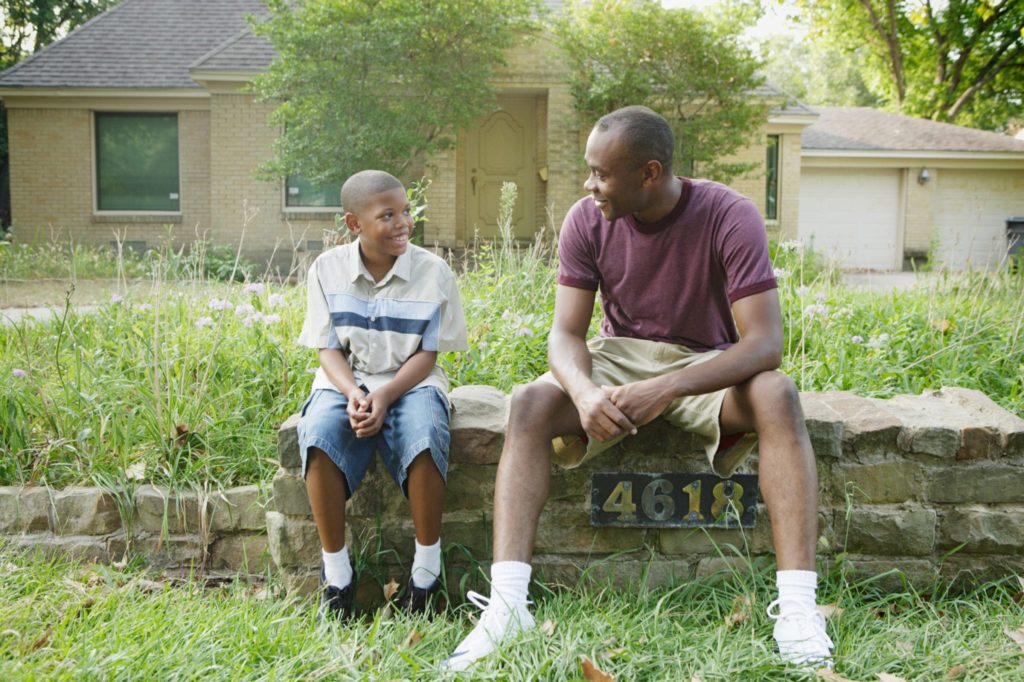Listen to this Chapter
Rock Bottom Resilience Boosters
Booster 1: Go For A Small Win
The Energy of The First Step
This booster is the quickest way to produce the hope that rock bottom is only a temporary destination and that better times lie ahead. As the definition suggests, rock bottom is a place where hope for a better tomorrow is in short supply.
The dimmest ray of hope can be energizing and feel empowering even when you’re at your lowest point. But hope has to rest on something real, something you can truly imagine occurring – something with a chance of happening. That’s where the power of achieving just one small win comes into play. Rather than despairing that you’ll never climb out of your rock bottom pit, you put one foot on the first rung of the ladder leading out of it.

Your own experiences with rock bottom are painful enough, but when your children are in this type of pain, you can feel particularly hopeless and helpless when their circumstances aren’t within your direct control. The list of potential sources of rock bottom agony for our children seems endless, and with social media the ways you can hurt each other are limited only by the imagination of anyone with a smartphone. As bleak as the view from rock bottom can be, small wins offer a way out. Here are some ways to begin:
Succeeding at even one small win creates the momentum to go after the next. This self-perpetuating cycle gives you the confidence to go after the harder items on your list.
The Planning Phase
Decide to face reality, as painful as that might be, by accepting whatever has driven you or your child to rock bottom.
With that reality in mind, set aside time to make a list of all the steps that need to be taken to get you out of rock bottom.
Sort the list into “hard” and “easy” tasks. An “easy” task might be one that you could complete right now. You might define “hard” tasks as those that will take longer to accomplish or require more resources.
Begin with the easy list and circle one action you (or your child) could take to check off that item as soon as possible.

The Action Phase
If you can take that action right now, stop reading about this booster and go for achieving that small win immediately. Otherwise, commit yourself to a specific time and resolve to resiliently tackle this task, regardless of how unpleasant this may be.
Notice the decreased anxiety you (or your child) feel just from taking a small action and experiencing success.
If you or your child are hesitant to move into this action phase, ask: what’s the worst thing that could happen if I try to accomplish this task and fail? Usually, you’ll be no worse off than you already were. And a benefit is the self-confidence you gain from having tried something.

Performing these steps still leaves the “hard” part of the list. The good news about tackling the “easy” part of the list is that succeeding at even one small win, however easy, creates the momentum to go after the next small win. This self-perpetuating cycle gives you the confidence to put off procrastinating going after the harder items on your list.
People who have studied this idea of achieving a small win have found that a person who achieves a series of wins at small but significant tasks results in attracting others who can become allies, as well as deter those who may oppose your efforts. More small wins accumulate, and rock bottom no longer appears like your permanent home.
Discussing this Booster with Your Child
Ask your kids about something – even a small thing – that they did recently that helped them feel a sense of accomplishment.
Explain that when we complete small tasks that bring us closer to a bigger goal, that’s called “small wins.”
Discuss a big goal or task that needs to be completed in the family. Complete the steps above to break the task into smaller chunks and help you achieve a series of small wins.
Come up with an incentive to complete the first series of small wins – a favorite treat or activity, perhaps. (See the power of incentive in the next section, “Discover the Power of a Future Promise.”
Reflection
Use the space below to complete the planning phase of your “small win action plan.” Then write about how it went. Is this an effective way for you to plan out major projects and tasks? What did you learn? Will you use this approach again?
Booster 2: Discover the Power of a Future Promise!
When you have a rock bottom circumstance, you find something to look forward to, something that can give you a vision or the incentive to keep going, even if it’s small.
Hope and a Hot Dog
In the book, The Resilience Breakthrough, Christian Moore shares an experience from his own childhood of a time when money was tight and there wasn’t a lot of food in the fridge. Knowing how angry and unmanageable Christian became when he was hungry, his mom would slip him $3 before school and tell him to buy a hot dog at Dairy Queen after school was out. He recalls:

“I’d go to school and sit in class all day, frustrated, struggling academically with my learning differences, feeling stupid and socially outcast, and all I could do was think about that hot dog at Dairy Queen… It was the highlight of my day, and the thought of it literally got me through so many hard times. Just the idea of something as simple as that hot dog out there somewhere in the universe gave me something to look forward to. That hot dog gave me hope.”
By giving him that one thing to look forward to each day, Christian’s mother was also giving him hope. The power of a future promise is just as real with your children, especially when your own family is experiencing a rock bottom moment.
This booster isn’t about spoiling or indulging your children, but the power of a future promise is something to keep in mind when your kids are going through a rough time. Once in a while, let a struggling child know that you’re making his/her favorite meal for dinner when they get home from school. Motivate your kids with reminders about exciting things coming up for them in the coming days or weeks – a sports game, a visit to their grandparents’, a birthday party, etc.
Find Your Own Future Promise
The power of a future promise is just as real for parents too. Being a parent isn’t easy, and it’s equally important for you to have something to look forward to. Remember the beginning of this chapter where we talked about identifying something you’re passionate about? That also applies here.
Take that thing and make it something you look forward to on hard days. Consider joining groups or organizations that share your passion. Most importantly, make time for your future promise. If you love running, wake up 30 minutes earlier and get in a jog before work. If you love reading, join a book club and set aside the time you need to attend meetings.

Don’t feel like you need to spend extra money on your “future promise.” It can be as simple as you need it to be – just make sure it’s something that you look forward to and that keeps you going on hard days.
The power of a future promise requires you to plan ahead and sometimes move things around in your schedule. But if it’s something that motivates you, it’s worth it.
Take the thing you’re passionate about and make it something you look forward to on hard days.
Discussing this Booster with Your Child
Share the story of Christian’s hot dog with your children. Ask if there is anything that they look forward to that helps them get through hard days.
Brainstorm with your children some activities, favorite meals, or other incentives that can be a “go-to” that they can look forward to when they need them. Consider writing these ideas on slips of paper and putting them in a “future promise” jar, to be pulled out on days when someone in the family is struggling and needs something to look forward to.
Reflection
Make a list of the future promises that can motivate you on the hard days. Think about things you’re looking forward to this week, this month, and this year. If you don’t have anything, make a plan for creating a new future promise.
Finding something to look forward to, something that can give you a vision or the incentive to keep going, can make all the difference… It can be something small, something as simple as a hot dog, or it can be something bigger, like a vacation you’re planning.”
Christian Moore – The Resilience Breakthrough, page 240
Additional Resources
Activities
